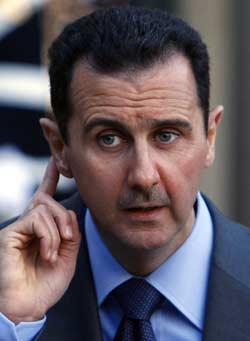He also said France would face "repercussions" if it took part in US-led plans for military action in response to an alleged chemical weapons attack by Assad's regime last month.
"The Middle East is a powder keg, and the fuse is getting shorter," Assad told the newspaper's correspondent in Damascus, in a rare interview with Western media.
"We cannot only talk about a Syrian response, but what could happen after the first strike. Nobody knows what will happen," Assad said.
"Everyone will lose control of the situation once the powder keg explodes. Chaos and extremism will spread. There is a risk of regional war."
Assad also said France, which has said it is prepared to back Washington in threatened military strikes in response to the alleged August 21 chemical attack, should consider the consequences of such action.
"Whoever works against the interests of Syria and its citizens is an enemy. The French people are not our enemy, but the policy of their state is hostile to the Syrian people," he said.
"Insofar as the policy of the French state is hostile to the Syrian people, the state will be its enemy... There will be repercussions, negative ones of course, on the interests of France."
.
However in another report that French intel says 'sophisticated' Syria chemical attack came from regime-held areas.
[caption id="attachment_411913" align="alignright" width="200"]
 Assad[/caption]
Assad[/caption]French intelligence documents made public on Monda said that the August 21 chemical weapons attack on a Damascus suburb was carried out by President Bashar al-Assad's regime and that at least 281 people were killed.
A source said the toll figured in a document given by Prime Minister Jean-Marc Ayrault to lawmakers during a meeting on the Syrian crisis, adding that the attack was "massive."
This came as a former high-ranking UN officials urged the United States and others Monday to refrain from bombing Syria over a devastating chemical attack, and instead work harder to broker a political solution in the war-torn country.
Former deputy chief of the United Nations Hans-Christof von Sponeck launched the appeal in Swiss daily Le Temps' online edition, with support from his former UN colleagues Denis Halliday, Said Zulficar, Samir Radwan and Samir Basta.
"True courage does not consist in sending in cruise missiles, ... it consists in radically breaking from this murderous logic," wrote von Sponeck, who coordinated the UN's humanitarian actions in Iraq from 1998 to 2000.
Much of the international community, including the United States, Britain and France, has blamed the Syrian regime for an August 21 chemical attack near the capital Damascus that killed hundreds.
The British parliament vetoed Prime Minister David Cameron's plans for an intervention, but Paris and Washington have said they are intent on punishing Assad's regime, even though US President Barack Obama has deferred action pending Congressional support.
Even if Western governments provide proof that the Syrian regime is to blame for the attack, "there is reason to remain sceptical and to remember all the questionable or fabricated pretexts used to justify previous wars", von Sponeck wrote, referring implicitly to the 2003 US invasion of Iraq on the basis of false intelligence.
"The time when the United States and the few allies it still has acted as the world police is over. The world has become more multifaceted and the people of the world want more sovereignty, not less," he stressed.
"The Syrian, Iranian and Russian governments have made proposals to negotiate, which have been treated with disdain by the West.
"Those who say: 'We cannot talk or negotiate with Assad' forget that people said the same thing" about a range of regimes and revolutionary movements like the Soviet Union, the Palestinian PLO, Irish IRA and former South African president Nelson Mandela and his ANC movement, among others," he pointed out.
Instead going into conflicts with bombs blazing, Western powers should focus on helping the parties settle their differences.
"For Israel to negotiate in good faith with the Palestinians, organise the Geneva 2 conference (to end the conflict in) Syria, and talk with the Iranians about their nuclear programme," von Sponeck suggested.
No comments:
Post a Comment